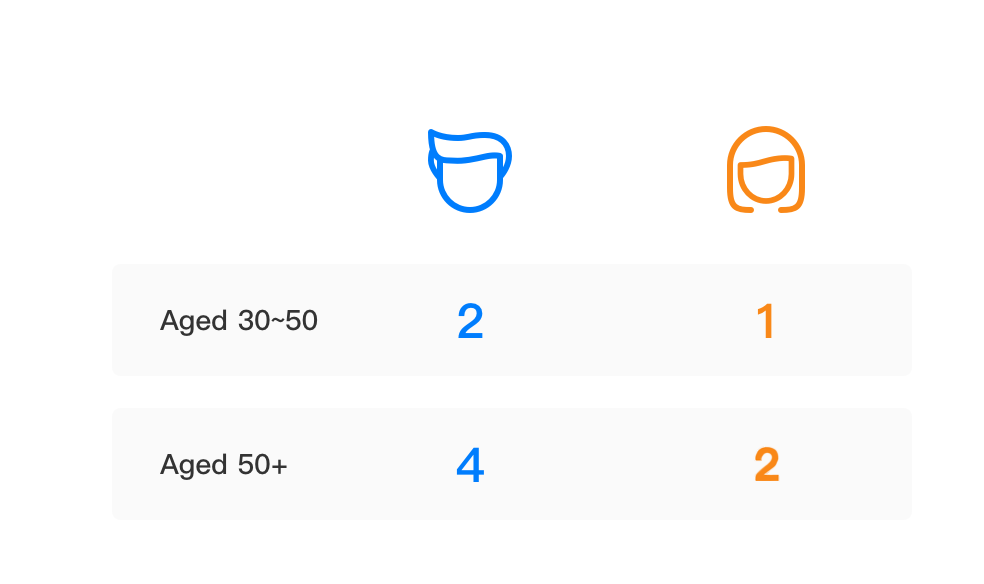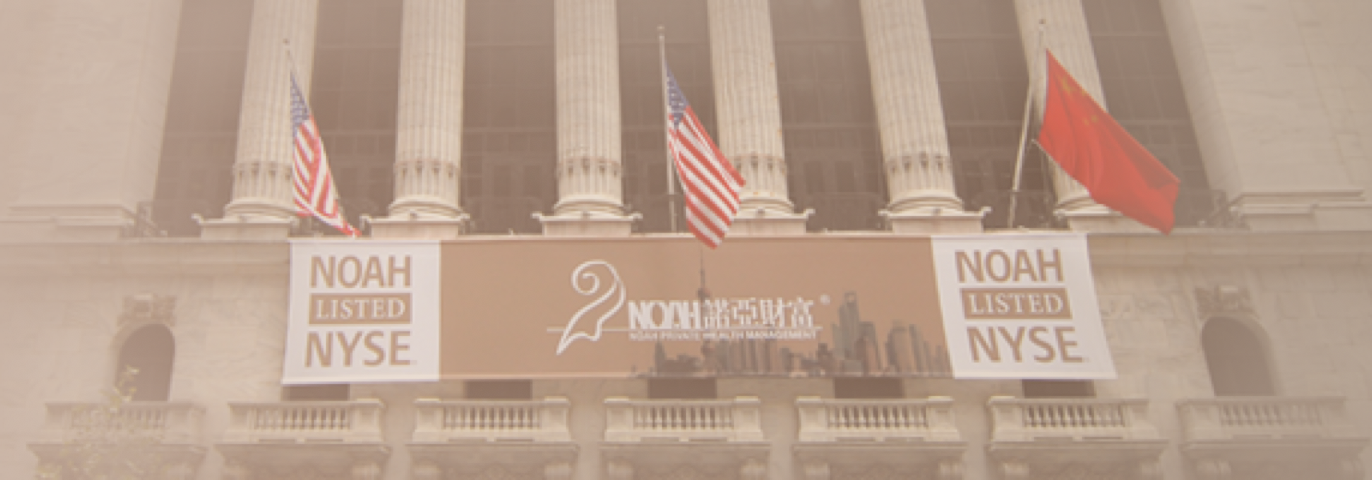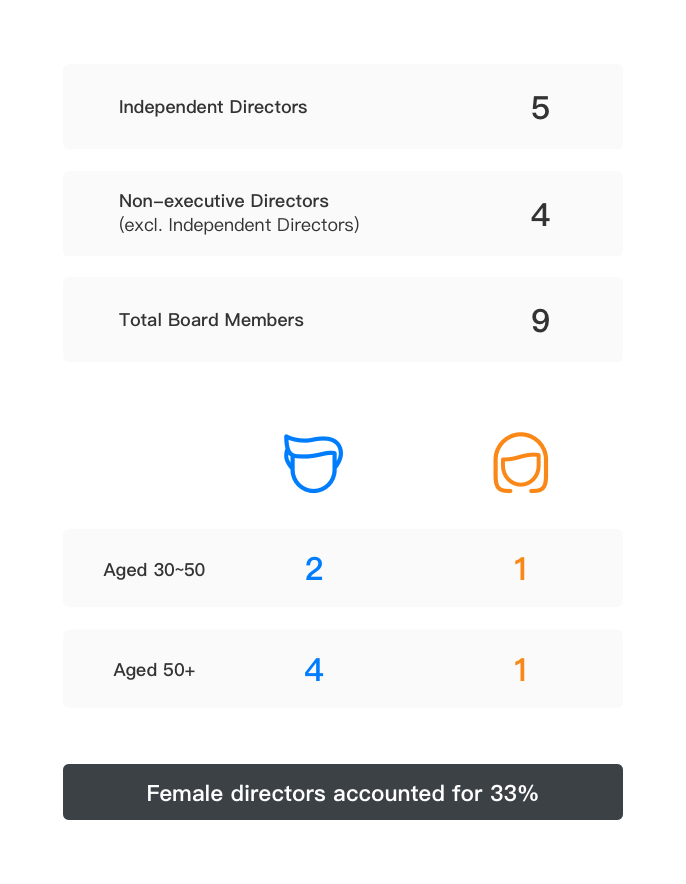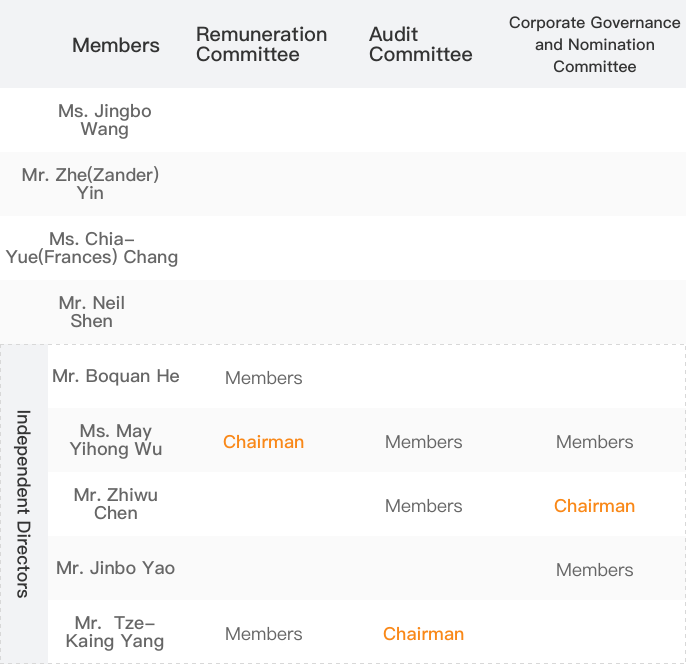Noah works to build a diverse board encompassing a wide variety of backgrounds (including gender, age, and nationality) and cultural experiences, as well as expertise, skills, and experiences. All members of Noah’s Board of Directors were selected and nominated by the Corporate Governance and Nominating Committee. The Board mainly consists of industry professionals with financial backgrounds and skills.
The nine members of the Board all have experience in risk management.
Founded in 2003, Noah Holdings (NYSE: NOAH) was successfully listed on the New York Stock Exchange on November 10, 2010,
as the first independent wealth management organization to go public from mainland China. Noah’s corporate governance
system follows U.S. Securities and Exchange Commission (SEC) regulations.
The Board of Directors plays an active role in managing and promoting Noah’s sustainable development. Guiding Noah towards
its vision of Sustainability, the board must review and approve the group's strategies and goals in this respect.

Board of Directors
The Board contains nine Directors ( three being female Board Directors, accounting for 33%), and their average tenure is 11.3 years. The five independent directors constitute over half of the Board (55.6%), supervising the Board’s effective operation and providing objective and professional advice on the Group’s business operation. In 2021, Noah held four quarterly board meetings (attended by 100% of directors each time), one special board meeting, four audit committee meetings, one remuneration committee meeting, and one shareholder meeting.
The shareholder meeting allowed all shareholders, Board Directors and stakeholders to thoroughly discuss Noah’s major business matters, which effectively improved our operating performance. In addition, the Noah ESG Committee gave a special report to the Board of Directors.
The shareholder meeting allowed all shareholders, Board Directors and stakeholders to thoroughly discuss Noah’s major business matters, which effectively improved our operating performance. In addition, the Noah ESG Committee gave a special report to the Board of Directors.

Board Structure
As an operational decision-making body, the Board of Directors oversees the Audit Committee, the Compensation Committee, and the Corporate Governance and Nominating Committee, all of which are chaired by independent directors. As per the regulations of the Securities and Exchange Commission (SEC), independent non-executive directors constitute over half of the board (5/9), which increases the Board’s transparency and efficiency.
>The average tenure of Audit Committee members is 8.62 years. The tenures of our independent directors are as follows: Tze-Kaing Yang (6.67 years), May Yihong Wu (11.17 years), and Zhi Wu Chen (8.00 years).
Members of the Board of Directors are appointed by the Corporate Governance and Nominating Committee, most of which are industry professionals with financial backgrounds and expertise. See Noah’s Annual Report for the details of our board members:
http://ir.noahgroup.com/financial-information/annual-reports
The Board of Directors conducts a self-evaluation of its performance each year. This encompasses the directors’ involvement in business operations, board constitution and structure, board culture, management of material issues (including ESG issues), decision-making, and tracking. The 2021 self-evaluation of all Directors was conducted in 100% compliance with corporate governance requirements.
>The average tenure of Audit Committee members is 8.62 years. The tenures of our independent directors are as follows: Tze-Kaing Yang (6.67 years), May Yihong Wu (11.17 years), and Zhi Wu Chen (8.00 years).
Members of the Board of Directors are appointed by the Corporate Governance and Nominating Committee, most of which are industry professionals with financial backgrounds and expertise. See Noah’s Annual Report for the details of our board members:
http://ir.noahgroup.com/financial-information/annual-reports
The Board of Directors conducts a self-evaluation of its performance each year. This encompasses the directors’ involvement in business operations, board constitution and structure, board culture, management of material issues (including ESG issues), decision-making, and tracking. The 2021 self-evaluation of all Directors was conducted in 100% compliance with corporate governance requirements.

Name
Compensation Committee
Audit Committee
Corporate and Nominating Committee
Ms. Jingbo Wang
Mr. Zhe Yin
Ms. Chia-Yue Chang
Mr. Neil Nanpeng Shen
Mr. Boquan He
Member
Ms. May Yihong Wu
Chairwoman
Member
Member
Professor Zhiwu Chen
Member
Member
Mr. Jinbo Yao
Member
Mr. Tze-Kaing Yang
Member
Chairman
*Board of Directors: http://ir.noahgroup.com/corporate-governance/board-of-directors
*Leadership: http://www.noahgroup.com/about/team
*Leadership: http://www.noahgroup.com/about/team
Title
Name
Education
Experience
Chairwoman of the Board of Directors
Chief Executive Officer
Chief Executive Officer
Jingbo Wang
Master of Management and Bachelor of Economics, Sichuan University
Chairwoman of the Board of Directors and CEO, Noah Holdings
General Manager of Private Banking Department, Xiangcai Securities
General Manager of Private Banking Department, Xiangcai Securities
Director
Zhe Yin
Bachelor of Economics, Shanghai University of Finance and Economics; Master of Business Administration, China Europe International Business School
Chairman, Gopher Asset Management
Independent Director, Guizhou Xinbang Pharmaceutical Co., Ltd (002390.SZ)
Director, Tianyu Digital Technology (Dalian) Group Co., Ltd. (002354.SZ)
Independent Director, Guizhou Xinbang Pharmaceutical Co., Ltd (002390.SZ)
Director, Tianyu Digital Technology (Dalian) Group Co., Ltd. (002354.SZ)
Director
Frances Chia-Yue Chang
Bachelor of Library Science, National University of Taiwan; Master of Library Science, University of California, Los Angeles
Executive Director and Chairwoman of Noah ESG Committee, Noah Holdings
Former Chief Marketing Officer, Noah Holdings
General Manager, Noah Upright Fund Distribution
Former Chief Marketing Officer, Noah Holdings
General Manager, Noah Upright Fund Distribution
Director
Neil Shen
Bachelor of Applied Mathematics, Shanghai Jiao Tong University; Master’s degree, Yale University
Founding and Managing Partner, Sequoia Capital China
Co-founder, Ctrip.com and Home Inns.
Independent Director
Boquan He
Guangdong Television Public University
Founder and Chairman, Guangdong Nowaday Investment
CEO, Robust Group
CEO, Robust Group
Independent Director
May Yihong Wu
Bachelor’s degree, Fudan University; Master’s degree, Brooklyn College, City University of New York; MBA
MBA, J.L. Kellogg Graduate School of Management at Northwestern University
Independent Director and Chairwoman of the Audit Committee, Swire Properties
Chief Strategy Officer, Home Inns
Chief Strategy Officer, Home Inns
Independent Director
Tze-Kaing Yang
Master of Business Administration, University of Illinois at Urbana-Champaign; Doctor of Business Administration, National Chengchi University in Taiwan
Chairman and CEO, Yangtze Associates, Taiwan-based venture capital and private equity fund management company
Political Deputy Minister of the Ministry of Finance in Taiwan
Acting Chairman of Bank of Taiwan
Managing Director of Bank of Taiwan and President of China Development Industrial Bank
Executive Secretary of National Development Fund of Taiwan
Independent Director
Jinbo Yao
Double Bachelor of Computer Science and Chemistry, Ocean University of China
Founder, Chairman of the Board of Directors and CEO, 58.com Inc.
CEO, Ganji.com; Co-founder, Xueda Education Group
CEO, Ganji.com; Co-founder, Xueda Education Group
Independent Director
ZhiWu Chen
Bachelor of Computer Science, Central-South University Master of Systems Engineering, Changsha Institute of Technology; Doctor of Financial Economics, Yale University
Professor, Director of Asia Global Institute, Chair Professor of Finance, and Victor and William Fung Professor in Economics at the University of Hong Kong
Special-Term Visiting Professor at Peking University (School of Economics) and Tsinghua University (School of Social Sciences and School of Economics and Management)
Member, International Advisory Board of the China Securities Regulatory Commission
Special-Term Visiting Professor at Peking University (School of Economics) and Tsinghua University (School of Social Sciences and School of Economics and Management)
Member, International Advisory Board of the China Securities Regulatory Commission
Title
Name
Field
Asset Management
Responsible Investment
Sustainability
Risk Management
Expertise / Skills
Accounting
Law
Information Security
Audit
Chairwoman of the Board of Directors
Chief Executive Officer
Chief Executive Officer
Jingbo Wang
√
√
√
√
√
√
√
√
Director
Zhe Yin
√
√
√
√
√
√
√
√
Director
Frances Chia-Yue Chang
√
√
√
√
√
√
√
√
Director
Neil Shen
√
√
√
√
√
√
√
√
Independent Director
Boquan He
√
√
√
√
√
√
√
√
Independent Director
May Yihong Wu
√
√
√
√
√
√
√
√
Independent Director
Tze-Kaing Yang
√
√
√
√
√
√
√
√
Independent Director
Jinbo Yao
√
√
√
√
√
√
√
√
Independent Director
Zhi Wu Chen
√
√
√
√
√
√
As for equity structure, Jing Investors Co., Ltd. (100% held by Ms. Jingbo Wang’s family trust) and Yin Investment Co., Ltd. (100% held by Mr. Zhe Yin’s family trust) hold Class B shares, each of which carries four times the voting right of a Class A share.
All major related-party transactions are disclosed in the company’s annual report. Each year, board members are asked if they work in any other capacity within the industry, or serve on the Board of Directors. This serves to safeguard the rights and benefits of shareholders and stakeholders.
All major related-party transactions are disclosed in the company’s annual report. Each year, board members are asked if they work in any other capacity within the industry, or serve on the Board of Directors. This serves to safeguard the rights and benefits of shareholders and stakeholders.
Performance Evaluation and Remuneration of Directors
Weight
Item
Indicators
70%
Operation and development goals
ROA, RONA, DOE, and ROIC
30%
Internal management goals
Execution of corporate strategies, management of the Company and its subsidiaries, and indicators of sustainable development
Senior management personnel are entitled to equity incentives which will be vested and awarded over 4 years. In the case of any senior management’s conduct is inconsistent with our corporate values or damaging to corporate interests during
the vesting period, the Company has the right to cancel any outstanding equity incentives.
Founded in 2003, Noah Holdings (NYSE: NOAH) was successfully listed on the New York Stock Exchange on November 10, 2010,
as the first independent wealth management organization to go public from mainland China. Noah’s corporate governance
system follows U.S. Securities and Exchange Commission (SEC) regulations.
The Board of Directors plays an active role in managing and promoting Noah’s sustainable development. Guiding Noah towards its vision of Sustainability, the board must review and approve the group's strategies and goals in this respect.
The Board of Directors plays an active role in managing and promoting Noah’s sustainable development. Guiding Noah towards its vision of Sustainability, the board must review and approve the group's strategies and goals in this respect.

Board of Directors
Noah works to build a diverse board encompassing a wide variety of backgrounds (including gender, age, and nationality) and cultural experiences, as well as expertise, skills, and experiences. All members of Noah’s Board of Directors were selected and nominated by the Corporate Governance and Nominating Committee. The Board mainly consists of industry professionals with financial backgrounds and skills.
The nine members of the Board all have experience in risk management.
The Board contains nine Directors ( three being female Board Directors, accounting for 33%), and their average tenure is 11.3 years. The five independent directors constitute over half of the Board (55.6%), supervising the Board’s effective operation and providing objective and professional advice on the Group’s business operation. In 2021, Noah held four quarterly board meetings (attended by 100% of directors each time), one special board meeting, four audit committee meetings, one remuneration committee meeting, and one shareholder meeting.
The shareholder meeting allowed all shareholders, Board Directors and stakeholders to thoroughly discuss Noah’s major business matters, which effectively improved our operating performance. In addition, the Noah ESG Committee gave a special report to the Board of Directors.
The nine members of the Board all have experience in risk management.
The Board contains nine Directors ( three being female Board Directors, accounting for 33%), and their average tenure is 11.3 years. The five independent directors constitute over half of the Board (55.6%), supervising the Board’s effective operation and providing objective and professional advice on the Group’s business operation. In 2021, Noah held four quarterly board meetings (attended by 100% of directors each time), one special board meeting, four audit committee meetings, one remuneration committee meeting, and one shareholder meeting.
The shareholder meeting allowed all shareholders, Board Directors and stakeholders to thoroughly discuss Noah’s major business matters, which effectively improved our operating performance. In addition, the Noah ESG Committee gave a special report to the Board of Directors.

Board Structure
As an operational decision-making body, the Board of Directors oversees the Audit Committee, the Compensation Committee, and the Corporate Governance and Nominating Committee, all of which are chaired by independent directors. As per the regulations of the Securities and Exchange Commission (SEC), independent non-executive directors constitute over half of the board (5/9), which increases the Board’s transparency and efficiency.
>The average tenure of Audit Committee members is 8.62 years. The tenures of our independent directors are as follows: Tze-Kaing Yang (6.67 years), May Yihong Wu (11.17 years), and Zhi Wu Chen (8.00 years).
Members of the Board of Directors are appointed by the Corporate Governance and Nominating Committee, most of which are industry professionals with financial backgrounds and expertise. See Noah’s Annual Report for the details of our board members:
http://ir.noahgroup.com/financial-information/annual-reports
The Board of Directors conducts a self-evaluation of its performance each year. This encompasses the directors’ involvement in business operations, board constitution and structure, board culture, management of material issues (including ESG issues), decision-making, and tracking. The 2021 self-evaluation of all Directors was conducted in 100% compliance with corporate governance requirements.
>The average tenure of Audit Committee members is 8.62 years. The tenures of our independent directors are as follows: Tze-Kaing Yang (6.67 years), May Yihong Wu (11.17 years), and Zhi Wu Chen (8.00 years).
Members of the Board of Directors are appointed by the Corporate Governance and Nominating Committee, most of which are industry professionals with financial backgrounds and expertise. See Noah’s Annual Report for the details of our board members:
http://ir.noahgroup.com/financial-information/annual-reports
The Board of Directors conducts a self-evaluation of its performance each year. This encompasses the directors’ involvement in business operations, board constitution and structure, board culture, management of material issues (including ESG issues), decision-making, and tracking. The 2021 self-evaluation of all Directors was conducted in 100% compliance with corporate governance requirements.

For more information on our ownership structure, please refer to the annual public disclosures.

About the Board Members
Performance Evaluation and Remuneration of Directors
Noah’s Board performs annual self-assessment, which KPIs included engagement in corporate operations, Board composition and structure, Board culture, management of major topics, decision-making and monitoring, with a maximum score of 43. In 2019, Directors’
average self-assessment score was 42,
In terms of management remuneration, Noah’s management team sets annual objectives and review criterias based on our corporate operating strategy and annual operating plan. These work objectives include:
In terms of management remuneration, Noah’s management team sets annual objectives and review criterias based on our corporate operating strategy and annual operating plan. These work objectives include:
Weight
Project(s)
Indicator Content
70%
Operational Development Objectives
Return on assets, return on net assets, return on equity , return on capital
30%
Internal Management Objectives
Promotion and execution of overall Group Strategy; and overall management of the Company and its subsidiaries


